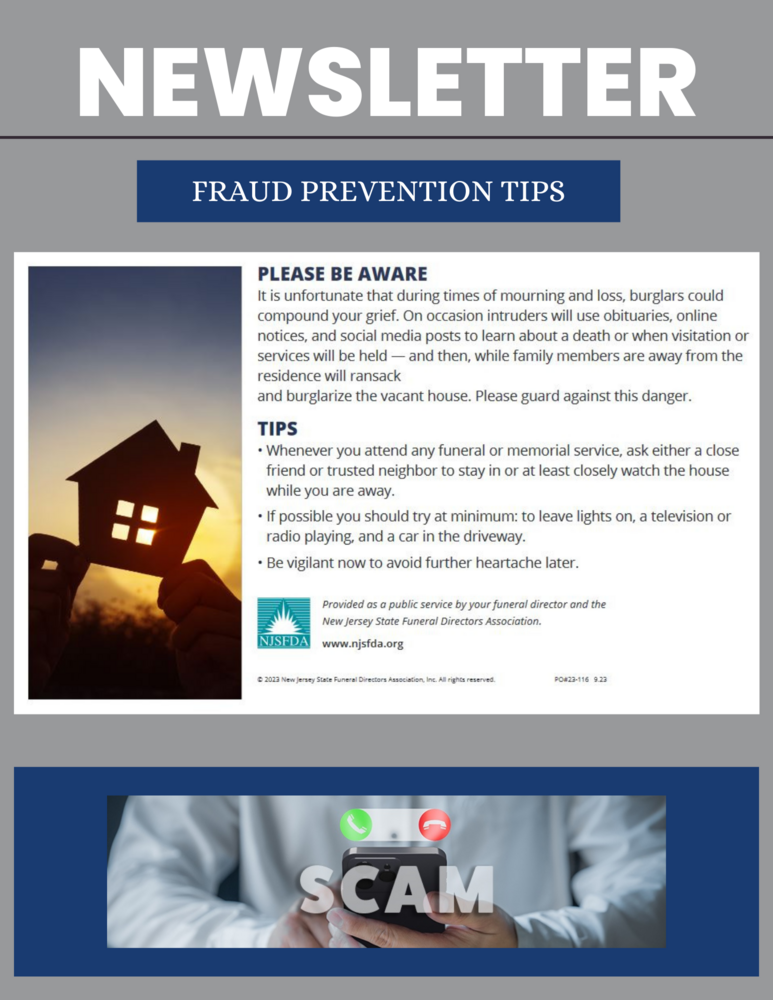

A new scheme in which scammers target consumers engaging funeral homes to arrange for services for family members has reached New Jersey.
Those running the scam call consumers and claim they are from the funeral home and need to verify financial information such as deposits, insurance policies or public assistance details. The scammers are even able to mask the number they are calling from and make it appear as if the funeral home itself is calling, a practice known as “spoofing.”
Originally seen in California, the scam was recently reported to the New Jersey State Funeral Directors Association by a member funeral home. A consumer engaging the funeral home reported that they had received a call requesting further information about insurance. The funeral home’s phone number was spoofed by the caller. The consumer, however, sensed the call was not legitimate and reported it to the funeral home.
The California Cemetery and Funeral Bureau warned funeral homes in the state to beware of the scam and warn their clients that such calls were seeking personal information for unlawful purposes.
The Federal Trade Commission lists the following tips for dealing with telephone scams seeking personal information:
Don't answer calls from unknown numbers. If you answer such a call, hang up immediately.
You may not be able to tell right away if an incoming call is spoofed. Be aware: Caller ID showing a "local" number does not necessarily mean it is a local caller.
If you answer the phone and the caller asks you to hit a button to stop getting the calls, you should just hang up. Scammers often use this trick to identify potential targets.
Do not respond to any questions, especially those that can be answered with "Yes."
Never give out personal information such as account numbers, Social Security numbers, mother's maiden names, passwords or other identifying information in response to unexpected calls or if you are at all suspicious.
If you get an inquiry from someone who says they represent a company such as a funeral home or a government agency, hang up and call the phone number on your account statement, in the phone book, or on the company's or government agency's website to verify the authenticity of the request. You will usually get a written statement in the mail before you get a phone call from a legitimate source, particularly if the caller is asking for a payment.
Use caution if you are being pressured for information immediately.
If you have a voicemail account with your phone service, be sure to set a password for it. Some voicemail services are preset to allow access if you call in from your own phone number. A hacker could spoof your home phone number and gain access to your voicemail if you do not set a password.
Talk to your phone company about call blocking tools they may have and check into apps that you can download to your mobile device to block unwanted calls.
If you use robocall-blocking technology already, it often helps to let that company know which numbers are producing unwanted calls so they can help block those calls for you and others.
To block telemarketing calls, register your number on the Do Not Call List https://www.donotcall.gov/. Legitimate telemarketers consult the list to avoid calling both landline and wireless phone numbers on the list.
Funeral directors may want to warn their clients of the possibility of such scam calls and urge them to contact the funeral home if anyone calls claiming they represent the home.
Those who believe they have been contacted by a scammer can report the call through the Federal Trade Commission’s website, www.FTCComplaintAssistant.gov. https://www.ftc.gov/ Complaints may also be filed by contacting the New Jersey Division of Consumer Affairs by email at AskConsumerAffairs@lps@state.nj.us.



